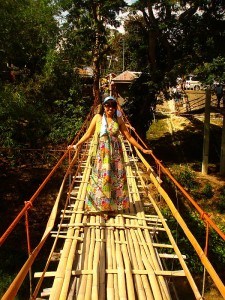
Green travel is not a new thing in the Philippines. Since 1992, ‘ecotourism’ or sustainable tourism development, has been a focus of the Philippines Department of Tourism.

Bohol, the tenth largest island in the Philippines offers diverse attractions of ecology, history, culture, and many natural heritage sites. Known for its Chocolate Hills, Philippine Tarsiers and cozy white sand beaches, Bohol has long been a favorite tourist spot in the Philippines, not only to foreign travelers but also local ones. Located centrally within the Philippines it is accessible from all major transport hubs, by air or by boat.
Aviation has a difficult relationship with sustainability; it generates nearly as much carbon dioxide in a year as the total population of Africa. Visitors to Bohol from closer destinations may want to consider one of the many ferry services available. Unfortunately, visitors from further afield often cannot avoid flying. You can offset your carbon emissions, either through your flight or tour operator or directly through organizations like Carbon Neutral, and contribute to a sustainable environmental project.
Come to Visit Bohol! A unique blend of Culture and Nature!
Find Some of the Best of Bohol Attractions
Bohol and Luxury Cruises
A ferry is not the only way to reach Bohol by sea. The cruise industry is the fastest growing travel sector in the world, and recently Bohol has been attracting attention as a cruise ship destination. It’s easy to understand the popularity of cruise ship travel; often all-inclusive, cruise ships are an easy and comfortable way to enjoy a multi-stop holiday.
But they use a lot of fuel, not just to sail but also to power what is essentially a giant floating hotel. In the past, the industry was criticized for knowingly polluting the seas and strongly resisting any sort of environmental regulation. But cruise ships are able to access unbeatable spots for wildlife watching and viewing natural wonders such as glaciers and the northern lights, they naturally appeal to the types of tourists who are interested in conservation. Luckily, the industry has long been cleaning up its act in an effort to become greener. The last 10 years have seen cruise ships cut their waste and garbage by almost 50%. They have invested in advanced technology making it possible to reuse wastewater for use in laundry and flushing toilets, installed solar panels and begun converting used cooking oil to more environmentally friendly biodiesel. Ships are fitted with high-efficiency appliances and new ships are built and designed in ways to protect and conserve the environment. The cruise ship Celebrity Solstice powers its elevators and 7,000 LED lights with 216 solar panels. With this focus on sustainability and protecting the environment, now is a great time for Bohol to be introduced as a cruise destination.
Check this out! Amazing BLIND 5 Year Old Girl Drummer from Bohol – Fantastic Performance
Local Travel Choices
But it’s not only the travel you choose to reach your destination to consider. When on holiday, use public transport or cycle whenever possible. Bohol has a good public transport network of buses, tricycles and jeepneys, the latter originating from the reuse of old US military jeeps and used all over the country as a means of public transport. For difficult to reach areas, river cruises allow visitors to venture deep into the countryside and Bohol offers many tours along the Loboc Rover.

Social versus Environmental – Balancing The Benefits
Greener travel isn’t just about the environment; it’s also about improving the lives of local people. Tourism offers work opportunities, increased commerce for local shops, and usually spurs reinvestment in the local area. In turn, eco-tourism specifically encourages practices that provide meaningful connections with locals and the chance for a greater understanding of local cultural and social issues. Air travel will produce carbon emissions; this is unavoidable. If you stay at home, your carbon footprint may stay low, but it also means any benefit your travel could have meant to that local community is lost. So fly and participate in the carbon offset scheme, and know that the tourist activities you choose to participate in will have a positive impact on the lives of the local people. We want to keep the world beautiful, but we also want to experience it. With a little thought and consideration, tourism can be an amazing, not only for us but also for the local people of the areas we visit. We must make the best of a bad choice, minimize the negative impact and try our hardest to maximize the positive.
2,259 total views, 1 views today
